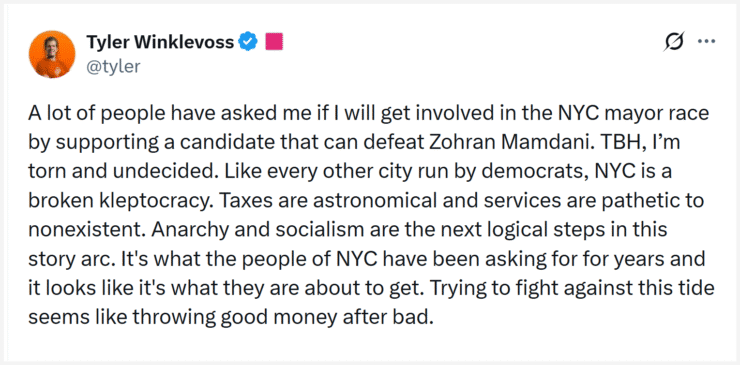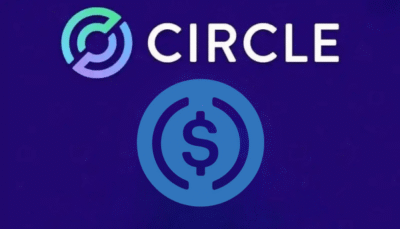Zohran Mamdani’s victory in New York City’s Democratic primary has thrust the city’s crypto policy into the spotlight, as he prepares to face opponents with established ties to the digital asset industry.
On Tuesday, Mamdani defeated former New York Governor Andrew Cuomo, securing 43.5% of the vote and upending expectations that Cuomo might coast to the nomination. Cuomo has since pledged to run as an independent candidate in the November general election.
Mamdani’s path to City Hall now goes through a crowded field that includes Republican Curtis Sliwa and incumbent Democratic Mayor Eric Adams — both of whom have built reputations as crypto proponents.
Adams famously accepted part of his 2021 mayoral salary in Bitcoin, hosted digital asset summits, and proposed BTC-backed municipal bonds to cement New York’s standing as a crypto hub. Sliwa, meanwhile, campaigned on a platform promoting more crypto ATMs and incentives for merchants to accept digital currencies.
Cuomo, for his part, faced criticism over consulting work for crypto exchange OKX while it was under U.S. investigation. The company ultimately paid over $500 million in penalties for operating as an unlicensed money transmitter.
Crypto Titans Mobilize Against Mamdani
Since Tuesday’s upset, Mamdani has drawn fire from some of the digital asset industry’s most powerful figures.
Gemini co-founders Cameron and Tyler Winklevoss have publicly floated funding a challenger. In a post on X, Tyler Winklevoss said he was ready to “get involved in the NYC mayor race,” echoing their multimillion-dollar support for Donald Trump’s presidential bid.

Bitcoin advocate Anthony “Pomp” Pompliano also rallied opposition, urging New Yorkers to reject Mamdani’s candidacy.
Hedge fund billionaire Bill Ackman weighed in as well, signaling he would back any credible candidate to prevent Mamdani from taking office.
“There are hundreds of millions of dollars of capital available to back a competitor to Mamdani that can be put together overnight,” Ackman posted.
“If the right candidate would raise his or her hand tomorrow, the funds will pour in.”
The early show of force underscores how much crypto leaders view New York City’s political climate as critical to protecting their industry’s future in the U.S.
Why NYC’s Mayor Still Matters to Crypto
New York City isn’t just America’s financial capital — it’s home to major crypto companies, including Gemini, Circle, MoonPay, and Paxos. Whoever occupies the mayor’s office will wield symbolic influence over whether the city remains friendly to the sector.
Mayor Adams has repeatedly used the city’s global profile to court blockchain investment, famously declaring last year: “If you’re in the crypto, blockchain, Web3 or the fintech space, New York City is open for business.”
Yet some policy levers remain out of the mayor’s hands. Since 2015, New York State’s Department of Financial Services has required crypto firms to secure a BitLicense to operate legally. Critics, including Adams, have called the system overly burdensome. Any future mayor would have limited formal power to change state regulations but could apply political pressure to Albany lawmakers.
For now, the race is shaping up as a litmus test for whether crypto’s growing political war chest can blunt a populist, anti-corporate candidacy in the heart of the financial world.
Quick Facts
- Zohran Mamdani defeated Andrew Cuomo in NYC’s Democratic primary, with Cuomo pledging an independent run.
- Major crypto figures, including the Winklevoss twins and Bill Ackman, are vowing to fund opposition to Mamdani.
- Adams, Sliwa, and Cuomo all have histories of supporting pro-crypto policies.
- New York’s mayor cannot directly repeal the state BitLicense but can influence debate around crypto regulation.





